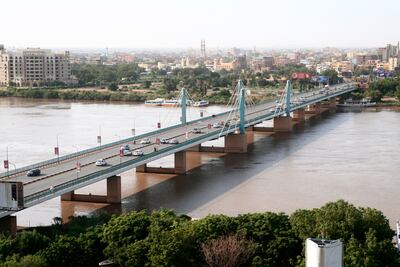Sudan’s capital on Wednesday retained the eerie quiet that has descended on it since the military seized power this week, as a civil disobedience campaign protesting against the takeover appeared to take root in the vast Afro-Arab nation.
Khartoum's only international airport reopened on Wednesday at 4pm local time, three days after its closure, according to Ibrahim Adlan, chairman of the civil aviation authority.
A doctors’ union said the death toll in clashes between protesters and security forces since Monday’s coup has risen to eight and the number of injured to 157.
Video clips purporting to show soldiers beating civilians on the streets with sticks are circulating on social media, with activists speaking of children joining men and women in anti-coup protests that are being dealt with brutally.
Sudanese security forces also detained three prominent pro-democracy figures on Tuesday evening, their relatives and other activists said on Wednesday.
Ismail Al Taj, a leader of the Sudanese Professionals’ Association, the group at the forefront of the protests that brought down Al Bashir; Sediq Al Sadiq Al Mahdi, a leader in Sudan’s largest political party, and brother of Foreign Minister Mariam Al Mahdi; and Khalid Al Silaik, a former media adviser to the prime minister were taken into custody.
Mr Al Silaik was detained moments after he gave an interview to broadcaster Al Jazeera, according to his wife, Marwa Kamel. In the interview, he criticised the military’s takeover, calling Hamdok and his government the legitimate administration of Sudan.
Sudan’s army chief Gen Abdel Fattah Al Burhan on Monday dismissed the civilian-led government and dissolved the joint-civilian Sovereign Council he had chaired since its creation.
Gen Al Burhan also announced an indefinite state of emergency and said a government of technocrats would be formed to lead the country under the military’s control until elections are held in July 2023. He said the army had no choice but to act to spare Sudan a civil war and vowed it will shepherd the nation to democratic rule.
He made it clear, however, that the military would retain the final word on policy, describing it as the custodian of the nation and guardian of its security and stability.
The coup was strongly condemned by Sudan’s western political and economic backers, including the US, the EU and the UN. Their condemnation and threats to suspend aid if the transition to democratic rule is not put back on track raise the prospect of Sudan once again becoming a pariah state, as it was during Al Bashir’s 29-year regime.
Significantly, the coup comes at a time when Sudan has made considerable progress in reversing decades of isolation under Al Bashir.
Sudan was formally lifted off Washington's list of states sponsoring terrorism in December, paving the way for more than $50 billion in debt relief and badly needed aid from the International Monetary Fund and World Bank.
At home, Prime Minister Abdalla Hamdok’s ambitious economic reform programme was beginning to bear fruit on the eve of the coup, with the local currency holding steady in the face of the US dollar, hyperinflation easing and a plentiful harvest season in prospect.
But a month-long blockade of the country's main commercial outlet, Port Sudan on the Red Sea, by protesters in the eastern region, has caused a severe bread shortage, adding to the hardships endured by the majority of the Sudanese already struggling to cope with price rises.
On Wednesday, witnesses in Khartoum said stores were shut for the third consecutive day. Traffic was scarce and the small number of pedestrians who ventured out moved cautiously to avoid the thousands of troops on the streets.
Government offices and banks were also closed and ATM machines did not work. The internet remained cut off.
Bridges on the Nile that connect the city’s three boroughs — Khartoum, Umm Durman and Bahari — appeared to have reopened, but the heavy presence by troops at both ends discouraged most motorists and pedestrians from using them.

Petrol stations in residential neighbourhoods also reopened on Wednesday, attracting long lines of cars, said witnesses.
"Sudan is boiling. Things need to go back to where they were. The coup added fuel to the fire," said government employee Mohanad Ahmed, 42, who is a Khartoum resident. "There must be a dialogue or the country will be engulfed in fire. The people with guns may win at the end, but the country will be deeply fractured."
Another Khartoum resident, self-employed Hafez Abdullah, said Monday's coup should have happened a year ago. "Security and economic conditions have been deteriorating and the state's prestige was eroded," he said.
He said Khartoum remained almost deserted on Wednesday, with people staying home because they feared arrest.
With the city paralysed, workers at Sudan's state petroleum company said they were joining a nationwide civil disobedience movement declared by trade unions to protest against Monday’s coup, according to an umbrella group of professional unions.
Already, a wide range of professional and trade unions have gone on strike, including those of doctors, teachers and central bank employees. Some ministries remained loyal to Mr Hamdok, using social media to state their opposition to the takeover.
Neighbourhood “resistance” committees have meanwhile announced a timetable for a series of demonstrations. The biggest is scheduled for Saturday.
The committees have since Monday barricaded streets in their areas, burned tyres and clashed with soldiers.











